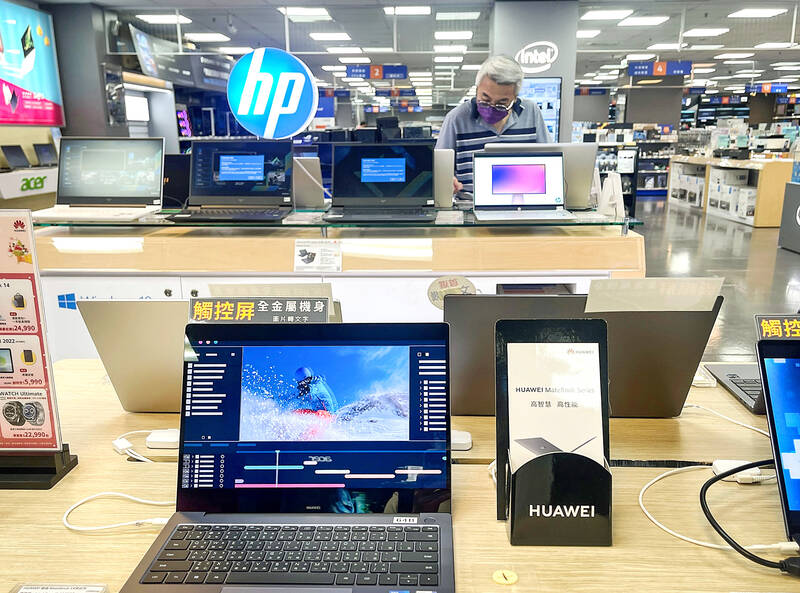Taiwan’s manufacturing output last quarter totaled NT$4.42 trillion (US$137.24 billion), rising 4.56 percent from a year earlier and reversing five straight quarters of decline, thanks to demand for electronics used in artificial intelligence (AI), high-performance computing chips and cloud services, the Ministry of Economic Affairs said yesterday.
Though global economic uncertainty lingers this year amid stubborn inflation, tight monetary policy and geopolitical tensions; demand from AI and other emerging technologies is sturdy, benefiting Taiwanese firms that supply high-end chips and servers, the ministry said.
As a result, major tech firms and partners in the supply chain have regained growth momentum and the pace of recovery would grow more evident in the second half of the year, it added.

Photo: CNA
The industrial production of electronics picked up 11.76 percent from the same period last year, with output for 12-inch wafer foundries climbing 14.06 percent to NT$889 billion, the ministry said.
The industrial production for displays and related devices also expanded 9.99 percent to NT$118.1 billion, as selling prices for large flat panels improved, it said.
Output related to PCs and optical products swelled by 27.21 percent to NT$339.3 billion, supported by the AI boom and inventory restocking, the ministry said.
Non-tech sectors also reported business improvement last quarter, although market demand leaves much to be desired, it added.
Output for base metal products squeezed a 1 percent gain, owing partly to a low comparison base a year earlier and mixed sales for electric vehicles, it said.
Industrial production for chemical products and machinery equipment floundered, as global markets have not yet shown a concrete recovery, which explains why their output shrank 5.7 percent and 2.29 percent respectively from a year earlier, the ministry said.
The pace of contraction has eased quarter by quarter, it added.
Overall, the industrial production index printed 87.26 during the January-to-March period, a 6.22 percent uptick after adjustments for inflation, putting an end to six quarters of negative growth, it said.
In related development, exports to Mexico soared 31.8 percent to a record US$1.81 billion in the first four months of this year on the back of strong demand for AI information communication technology products, the Ministry of Finance said yesterday.
Mexico-bound exports might exceed US$5 billion this year, as corporations attempt to take advantage of favorable trade terms under the US-Mexico-Canada Agreement, it added.

Semiconductor business between Taiwan and the US is a “win-win” model for both sides given the high level of complementarity, the government said yesterday responding to tariff threats from US President Donald Trump. Home to the world’s largest contract chipmaker, Taiwan Semiconductor Manufacturing Co (TSMC, 台積電), Taiwan is a key link in the global technology supply chain for companies such as Apple Inc and Nvidia Corp. Trump said on Monday he plans to impose tariffs on imported chips, pharmaceuticals and steel in an effort to get the producers to make them in the US. “Taiwan and the US semiconductor and other technology industries

SMALL AND EFFICIENT: The Chinese AI app’s initial success has spurred worries in the US that its tech giants’ massive AI spending needs re-evaluation, a market strategist said Chinese artificial intelligence (AI) start-up DeepSeek’s (深度求索) eponymous AI assistant rocketed to the top of Apple Inc’s iPhone download charts, stirring doubts in Silicon Valley about the strength of the US’ technological dominance. The app’s underlying AI model is widely seen as competitive with OpenAI and Meta Platforms Inc’s latest. Its claim that it cost much less to train and develop triggered share moves across Asia’s supply chain. Chinese tech firms linked to DeepSeek, such as Iflytek Co (科大訊飛), surged yesterday, while chipmaking tool makers like Advantest Corp slumped on the potential threat to demand for Nvidia Corp’s AI accelerators. US stock

The US Federal Reserve is expected to announce a pause in rate cuts on Wednesday, as policymakers look to continue tackling inflation under close and vocal scrutiny from US President Donald Trump. The Fed cut its key lending rate by a full percentage point in the final four months of last year and indicated it would move more cautiously going forward amid an uptick in inflation away from its long-term target of 2 percent. “I think they will do nothing, and I think they should do nothing,” Federal Reserve Bank of St Louis former president Jim Bullard said. “I think the

SUBSIDIES: The nominee for commerce secretary indicated the Trump administration wants to put its stamp on the plan, but not unravel it entirely US President Donald Trump’s pick to lead the agency in charge of a US$52 billion semiconductor subsidy program declined to give it unqualified support, raising questions about the disbursement of funds to companies like Intel Corp and Taiwan Semiconductor Manufacturing Co (台積電). “I can’t say that I can honor something I haven’t read,” Howard Lutnick, Trump’s nominee for commerce secretary, said of the binding CHIPS and Science Act awards in a confirmation hearing on Wednesday. “To the extent monies have been disbursed, I would commit to rigorously enforcing documents that have been signed by those companies to make sure we get